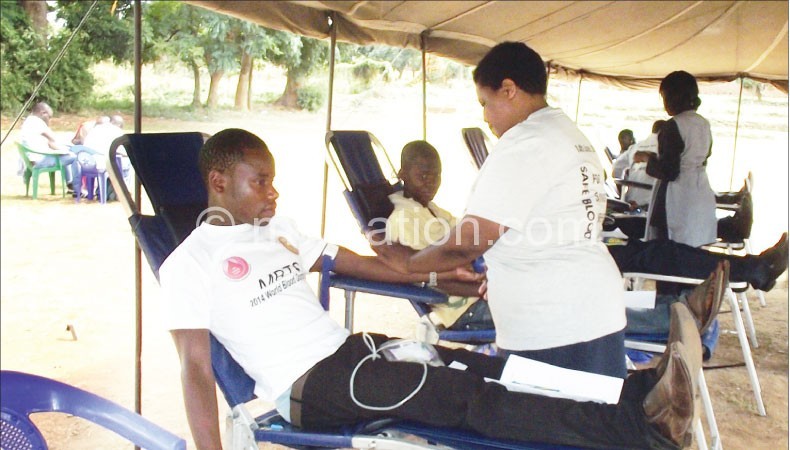Myths affecting blood donation

June 6 is World Blood Donor Day. Malawi commemorated this day in Zomba amid revelations that many people shun donating blood due to myths, yet Malawi requires 30 000 units of blood every year.
If the blood transfusion technology were non-existent, 28-year-old Lydia Maweya of Mkwapatira Village, Traditional Authority (T/A) Mlumbe in Zomba believes she could be in the grave by now.
The mother of one says she survived a coma induced by blood shortage after receiving a blood donation at Zomba Central Hospital (ZCH) last year.
“I had just given birth three weeks earlier when I started bleeding. At first I thought it was nothing to worry about. But a few days later, it became so bad that I fainted. I was taken to Matawale Health Centre and later referred to ZCH where they observed that I needed blood,” said Maweya in an interview.
She says since the blood transfusion, she has been feeling well.
“I spent four days on a hospital bed after the blood donation. I still pray for those that donated the blood that saved my life,” she says.
Maweya’s prayer is necessary. Cases of blood shortage in the country’s hospitals are common. Despite enormous efforts by Malawi Blood Transfusion Service (MBTS) to bank blood for emergencies, the country has never had enough blood to satsfy the demand.
Formed in 2004, MBTS has never achieved a 100 percent blood stock. As such, lives of patients continue to be lost due to lack of blood. Under-five children and pregnant mothers have been the main victims, according to health experts.
World Health Organisation (WHO) Malawi office told a gathering at the function celebrated under the theme ‘Safe blood for saving mothers’ that in Africa, one in 38 pregnant women dies of post-partum haemorrhage, which is birth related bleeding. On the other hand, under five children mostly need blood for anaemia induced by malaria.
WHO country representative Eugene Nyarko says 65 percent of blood transfusion in low income countries is given to children under the age of five and says there is need to expand the blood banks to ensure there is enough stock to save lives of children and pregnant mothers.
MBTS chief executive officer Natasha Nsamala admits that her office struggles in blood collection. She says Malawi needs 80 000 units of blood per year, but only collects 50 000 units through voluntary and unpaid blood donation.
“We are in huge deficit but we are doing everything possible to ensure we collect as much blood as possible,” she says.
Nsamala says most blood donors are aged between 16 and 25. She says MBTS is conducting research to determine why this is the case.
However, she says some people are reluctant to donate blood because of myths attached to the practice.
During the commemoration, some people spoke about beliefs that make people shun donating blood such as experiencing dizziness that never ends while in the case of women, developing pregnancy-related complication.
Verina Munde says poor people should not risk donating blood because they usually do strenuous work.
“I am informed people who are involved in hard work need to have enough blood because their hearts beat faster and so removing blood will only risk my health. In 2012, my friend at school collapsed after donating blood, this really scared me,” says Munde.
While admitting that some people feel dizzy after donating blood, Nsamala says the dizziness is temporary as it occurs because the body is adjusting itself to reduced blood level. She says MBTS does not just pump blood, but follows procedures to ensure both the donor and the recipient are safe.
“There are conditions that we observe before taking blood from a donor. Most of our blood donors are students who come from resource limited families and we advise them to report any problems they face after blood donation. Since 2004, we have not received any serious reports of ill-health,” she says, adding that foods that help in replacing blood are local and accessible.
Nsamala says that the body has a mechanism that replaces lost blood automatically within a short time with the support of a balanced meal.
Bright Biya, a soldier at Cobbe Barracks in Zomba, says he has donated blood 15 times since 2005 and has never experienced any health complication.
Alfred Elias, a laboratory technician at Ntcheu District Hospital, says complications associated with blood donation are unsubstantiated.
“Blood donors only lose a pint (about 450mls) and this is less than 10 percent of blood volume of an average person. After donation, the human body has an amazing capacity to replace all fluids and cells that have been removed.
“The kidney has cells called peritubular and they are sensitive that upon donating blood, they start secreting protein called erythropoietin to trigger bone marrow to produces stem cells and the protein advises the cells to develop into more red blood cells. The human body makes millions of red blood cells every second so it does not take long to build up lost blood cells,” Elias explains.
In response to calls from WHO that Malawi needs an extra effort supported by Ministry of Health, national and international partners to come up with an activity plan to influence people to donate more blood and ensure there is enough blood stock, Nsamala says her office has planned a sensitisation campaign targeting both regular and new donors. She says emphasis will be to establish why some age groups do not donate blood.




